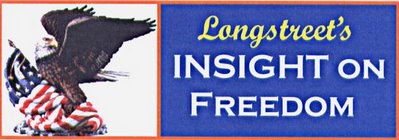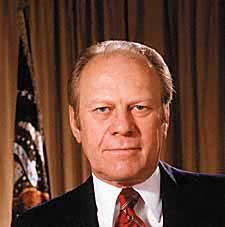 America’s longest living past-President has died. Gerald R. Ford, 93, has passed from this life to the next.
America’s longest living past-President has died. Gerald R. Ford, 93, has passed from this life to the next.Here is a little information on this historic figure in American History. There is much more at: http://en.wikipedia.org/wiki/Gerald_Ford
************************************
Gerald Rudolph Ford, Jr. (July 14, 1913–December 26, 2006[1]) was the 38th President (1974–1977) and 40th Vice President of the United States (1973–1974). He was the first person appointed to the Vice-Presidency under the terms of the 25th Amendment; and, upon succession to the presidency, he became the only president in U.S. history to fill that office without having been elected either President or Vice-President. He was also the longest-lived United States president, having surpassed Ronald Reagan's record on November 12, 2006.
Ford was born in Omaha, Nebraska. He was originally named Leslie Lynch King, Jr., after his biological father. His parents divorced when he was less than a year old, and when his mother remarried, he was given the name of his step-father, Gerald Rudolff Ford. He later changed the spelling of the middle name. Ford obtained his bachelor's degree from the University of Michigan, where he was a football star. He went on to obtain a law degree from Yale University before serving in the United States Navy during World War II. Returning from the war a confirmed "internationalist", Republican Ford defeated the incumbent in the party primary and was elected to the United States House of Representatives in 1948, representing the Grand Rapids, Michigan, area. He was elected House Minority Leader in 1963 and served in the House until 1973. When Spiro Agnew resigned, Ford was appointed Vice President of the United States at the height of the Watergate scandal, which eventually led to Richard Nixon's resignation.
The Ford administration saw the withdrawal of American forces from Vietnam, the execution of the Helsinki Accords, and the continuing specter of inflation and recession. Faced with an overwhelmingly Democratic majority in Congress, the administration was hampered in its ability to pass major legislation, and Ford's vetoes were frequently overridden. Ford was criticized by many for granting a pre-emptive pardon to Nixon, and was subsequently defeated by Democrat Jimmy Carter in the 1976 presidential election.

The Nixon Pardon
On September 8, 1974, Ford gave Nixon a full and unconditional pardon for any crimes he may have committed while President.[21][22] In a televised broadcast to the nation, Ford explained that he felt the pardon was in the best interests of the country and that the Nixon family's situation "is an American tragedy in which we all have played a part. It could go on and on and on, or someone must write the end to it. I have concluded that only I can do that, and if I can, I must."[23] At the same time as he announced the Nixon pardon, Ford introduced a conditional amnesty program for Vietnam War draft dodgers who had fled to countries such as Canada.[24] Unconditional amnesty, however, did not come about until the Jimmy Carter presidency.[25]
The Nixon pardon was highly controversial. Critics derided the move and claimed a "corrupt bargain" had been struck between the men.[3] They claimed Ford's pardon was quid pro quo in exchange for Nixon's resignation that elevated Ford to the Presidency. Nixon's chief of staff, Alexander Haig, offered a deal to Ford. Bob Woodward, in his book, Shadow, recounts the Haig deal. Woodward recounts that Haig entered Ford's office on August 1, 1974 while Ford was still Vice President and Nixon had yet to resign. Haig told Ford that there were three pardon options: (1) Nixon could pardon himself and resign, (2) Nixon could pardon his aides involved in Watergate and then resign, or (3) Nixon could agree to leave in return for an agreement that the new president would pardon him. After listing these options, Haig handed Ford various papers; one of these papers included a discussion of the president's legal authority to pardon and another sheet was a draft pardon form that only needed Ford's signature and Nixon's name to make it legal. Woodward summarizes the setting between Haig and Ford as follows: "Even if Haig offered no direct words on his views, the message was almost certainly sent. An emotional man, Haig was incapable of concealing his feelings; those who worked closely with him rarely found him ambiguous." Despite the situation, Ford never accepted the offer from Haig and later decided to pardon Nixon on his own terms. Regardless, historians believe the controversy was one of the major reasons Ford lost the election in 1976.
He also served as a member of the Warren Commission.
ReplyDeleteWhy is that fact not reported?
Marvin, you are absolutely right. He did serve on the Warren Commission. I have not seen that reported elsewhere, either.
ReplyDeleteThanks for the nudge!
Best regards for a Happy New Year!
Longstreet